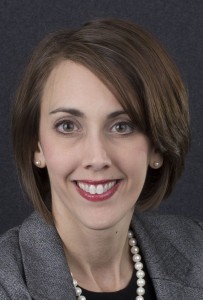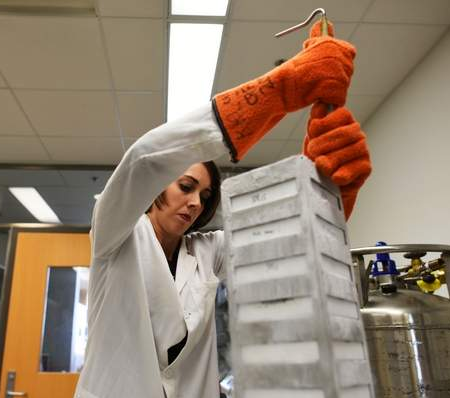BTN.com staff, BTN.com staff, April 10, 2015
 For as long as she can remember, University of Iowa research professor Kristina Thiel has been fascinated by science. She discovered her calling in an unlikely place as a girl growing up in the small town of Andalusia, Ala.
For as long as she can remember, University of Iowa research professor Kristina Thiel has been fascinated by science. She discovered her calling in an unlikely place as a girl growing up in the small town of Andalusia, Ala.
?My dad owned a little dry cleaners and at a really young age, I was fascinated with the chemistry behind it,? she said in her soft Southern accent. ?I knew that how you get the stains out of clothing is based on one thing: chemistry.?
From those unassuming origins, Thiel launched a career devoted to trying to kick cancer where it counts. After attending a small arts school in Birmingham, she studied at the University of Alabama, an experience Thiel says ?developed my hunger to find better cures for patients.? After obtaining her Ph.D. at Vanderbilt, Thiel ended up in Iowa City and she?s been there ever since researching new ways to fight cancer.
?Proteins fuel tumor growth,? she said. ?My mission is to find what turns off that protein and then stop the growth of cancer. If you can get the protein to reach inactive status, then the cancer won?t grow.?
In addition to her position as research professor, Thiel is chair of the Department of Obstetrics and Gynecology at the University of Iowa. She also co-founder of Immortagen, a company that provides personalized cancer treatment solutions. (The company?s co-founder, Dr. Kim Leslie, is currently in remission from ovarian cancer.)
Why save the world in Iowa? Thiel came to the university to do post research, which she likens to a medical residency.
?I started working on early drug discovery and developing new molecules to turn off these proteins,? she said.
Thiel said she?s benefited from substantial institutional and financial support during her time at Iowa. One great example of this is the University of Iowa Research Foundation, which has provided various mentors and much of the funding for her work.
Thiel is philosophical about cancer. When asked if the disease could be stopped altogether, she insisted that prevention is not her field of study. But she still has informed opinions on the subject.
?There are genetic reasons people get cancers and cell mutations that happen within the body,? she says. ?Sometimes this happens because of how our body changes over a lifetime. Other time, there are things like smoking that [people] should quit. Other factors are tougher to pinpoint when you ask why someone gets the disease.?
Most cancer patients don?t realize a sad truth: The vast majority of them are currently treated based on averages, without regard to what specific medications and therapies might work best in their individual circumstances.
?It?s not personalized - and it should be,? she said. ?We still have a long way to go with cancer research. I think we?re on the precipice now. We do have incredible technology and can understand genetic change and mutations. We?re also rapidly developing tools to interpret that data and understand how to treat each patient.
[btn-post-package]?Just having the genetic sequencing is not enough to make a treatment decision unless it?s leukemia,? she added. ?Some patients can have 700 mutations in their tumor. The question remains: How do you pick a drug? The way I look at it is like a book where the pages are out of order. You need to put the pages in order. That?s why we?re developing algorithms to find the right treatment for each person.?
Thiel has a personal stake in this game. She speaks in a sad tone when she recounts important people in her life who?ve been affected by cancer.
?My grandmother had lung cancer and my grandfather had early-stage colon cancer that was treated,? she said. ?One of my closest friends had a melanoma that went to his brain. He died young.?
The thought of preventing similar misfortunes from happening to others keeps Thiel going in her fight.
?My heart breaks for everyone who is touched by cancer ? which is pretty much every single person in one way or the other,? she said. ?I just really want to help all of them. It might sound lofty, but I feel it?s a fight worth fighting.?
She paused, and her voice cracked as she added, ?I just have to make it better.?
By Cindy Pearlman







